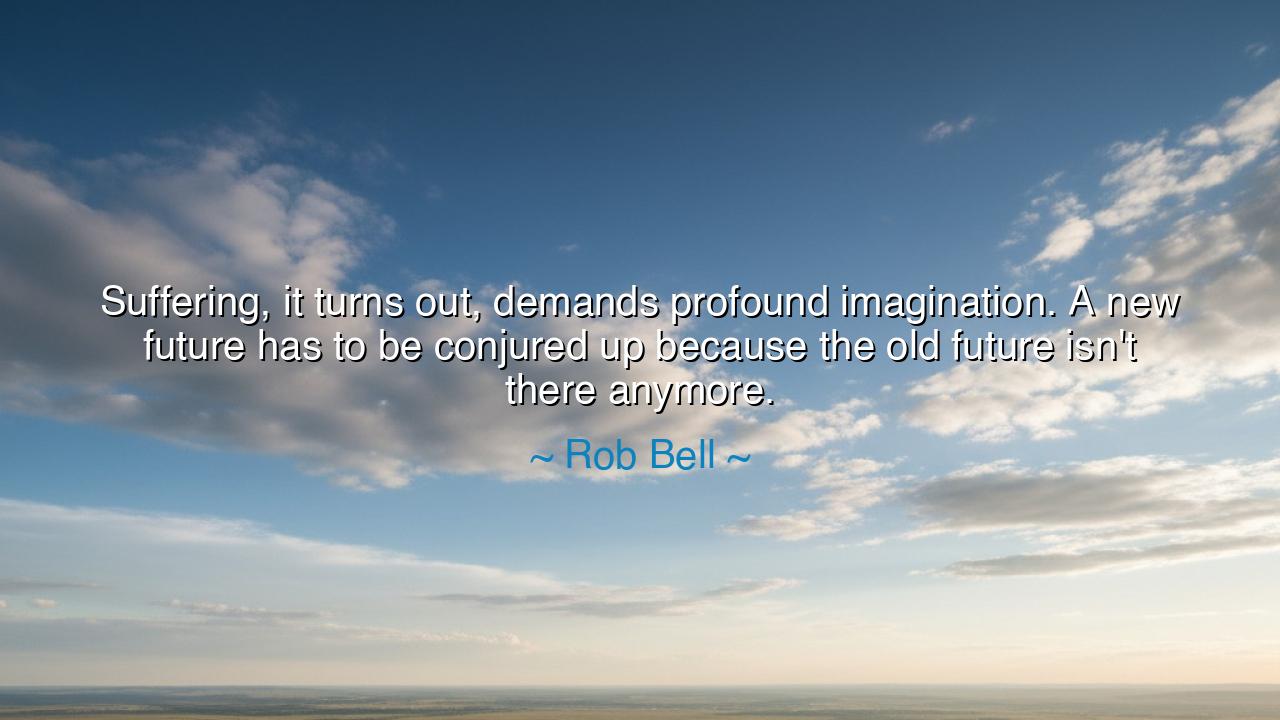
Suffering, it turns out, demands profound imagination. A new
Suffering, it turns out, demands profound imagination. A new future has to be conjured up because the old future isn't there anymore.






The words of Rob Bell — “Suffering, it turns out, demands profound imagination. A new future has to be conjured up because the old future isn’t there anymore.” — shine with the deep and sacred light of truth born from pain. In them, we hear the voice of one who has looked into the abyss and discovered not despair, but the spark of rebirth. For suffering, though it crushes and humbles, is also the furnace where imagination is refined. When the old paths crumble, when what was once possible vanishes like mist, the soul must do the impossible — it must imagine again. In this act of imagination, suffering becomes not the end of life, but the beginning of transformation.
The origin of Bell’s insight lies in the timeless human experience of loss and reinvention. He speaks as one who has wrestled with grief — personal, spiritual, and communal — and found that the only way forward is through creation. When the old future is gone — when dreams have shattered, relationships have dissolved, or worlds have fallen apart — the heart faces a void. That void is unbearable unless filled by something new, and it is imagination that must rise to fill it. The thinker, the artist, the survivor — all become alike in this moment: each must learn to envision a horizon where none seems to exist.
Consider the story of Nelson Mandela, who spent twenty-seven years in a cell so small that he could barely stretch his legs. The world he had known — the one where justice might come swiftly, where freedom could be seized through action — was destroyed. Yet in that darkness, he began to imagine a new South Africa, one where reconciliation triumphed over revenge. His body was imprisoned, but his imagination was boundless. When he finally emerged into daylight, he did not return to the future that was lost; he walked into the one he had conjured in his suffering. Thus, imagination became both his refuge and his weapon — the power to dream a new world into being when the old one had died.
This is what Bell means: suffering demands profound imagination because it leaves us stripped of illusions. The life we once envisioned — the “old future” — collapses under the weight of reality. It may be the loss of a loved one, the end of a calling, or the shattering of faith. But in that shattering, the mind and heart are forced to create a new map of meaning. Without imagination, suffering imprisons us. With it, we begin to rebuild — not the same house, but a new dwelling for the soul. Imagination, in this sense, is not escapism; it is resurrection.
In the ancient world, the myth of the Phoenix told this very truth. The bird, consumed by flame, does not vanish in its suffering; it rises renewed from the ashes, radiant and whole. Yet the fire is essential — for only through destruction can new creation come. So it is with the human heart. The fire of suffering strips away all false hopes and leaves us bare before eternity. In that stillness, when all that we knew is gone, we must imagine again — and in imagining, we are reborn.
Even the story of Job, from the sacred scriptures, echoes this wisdom. When all was taken from him — his wealth, his children, his health — he could not return to the life he had before. The old future was dead. Yet through the fire of lamentation and questioning, his soul learned to see differently. He found a new vision of the divine, a new understanding of himself. His suffering, though cruel, demanded that he imagine a God larger than the one he had known — and in that act of imagination, his faith was transformed from tradition to revelation.
Let this, then, be the lesson to those who suffer: do not look for the old future to return. It will not. The river has moved on; the landscape has changed. Instead, take up the divine work of imagination. Begin to envision a new life, however fragile, however uncertain. In every ending lies the seed of beginning — but that seed must be watered by courage and imagination. Picture a life where healing can happen, where love can grow again, where purpose can be found not despite the pain but through it.
For as the ancients would say, the imagination is the lamp of the heart — it lights the way through the darkness of grief and despair. When suffering comes, it takes from us what we thought we could not lose. But it also gives us the gift of creation: the power to dream a new reality. And so, let us not curse our sorrows, but use them as the soil from which new visions grow. For when we dare to imagine after we have suffered, we do not merely survive — we resurrect.






AAdministratorAdministrator
Welcome, honored guests. Please leave a comment, we will respond soon